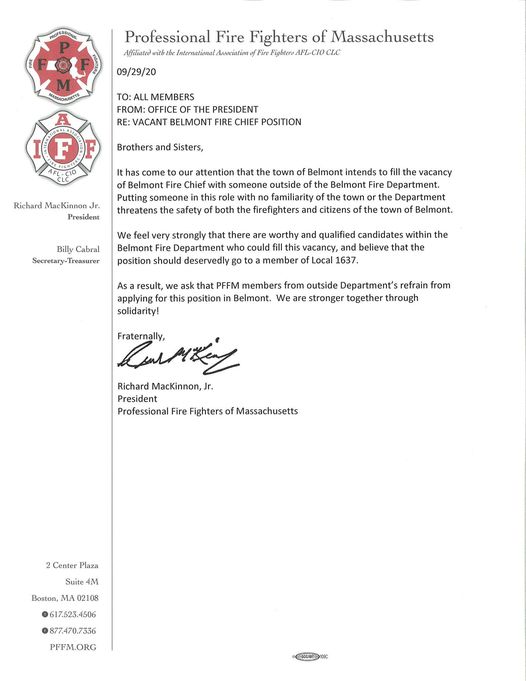Photo: Belmont Fire Chief David DeStefano
A jump in the fees to call a Belmont Fire Department ambulance will add more than a quarter of a million dollars to the town budget after the Belmont Select Board unanimously approved the cost hike at its virtual meeting on Monday, May 11.
The changes to what was called an out-of-date fee structure came after Chief David DeStefano compared the costs being charged for ambulance services in neighboring and comparable towns and finding Belmont should bump up its fees.
“Certainly it’s a forecast at this point, but it will come to fruition one day. I think that would definitely put us on the right path.” said DeStefano, who came before the board with an initial proposal three weeks earlier and was asked by the members to return with a more flushed out draft.
The new fee structure will be:
| Service | Former fee | New fee |
| Basic Life Service (BLS) | $1,850 | $1,999 |
| Advance Life Service 1 (ALS) | $2,350 | $2,475 |
| Advance Life Service 2 (ALS2) | $2,800 | $2,950 |
What does BLS, ALS all mean? Here’s a short explainer.
The per mile charge will rise to $40.
According to DeStefano, the estimated annual revenue in fiscal 2022 using the new fee structure – using historical data from 2020 – will bring in $953,000, compared with $662,000 in 2020. The change will result in an additional $291,000 coming into the town’s coffers.
“Clearly … the rates that we’re using are outdated and we need to get to higher rates so I’m full steam ahead,” said Board member Mark Paolillo.
Using a conservative estimate of $250,000 in new revenue coming to the ’22 budget, Town Administrator Patrice Garvin told the board the added monies could be used to fill critical personnel holes in several departments. “Any additions would have to have recurring revenue behind it, at least that’s my guiding philosophy on the budget,” said Garvin.
One such need is reinstating a Building Automation Systems Manager for the new Middle and High School who will oversee the efficient running of the building beginning in September. That post was set aside after the Proposition 2 1/2 override was defeated at the April Town Election.
The second position is a diversity coordinator the town could share with the Belmont schools. While there are “further discussions on how to develop and incorporate this position, either with the schools, the town or both,” Garvin would “park that position in the town’s budget” for now. Both positions would run between $105,000 to $110,000 in salary and benefits.
Dash said the two positions have been discussed in detail with the facilities department “having a dire need for sure” for the systems manager. “If we don’t maintain our [buildings], we’re just going to pay more later,” said Dash.
Paolillo did push back on the hiring of a full-time diversity director for the town suggesting the schools assume financial responsibility initially for the position and the town wait for the town’s diversity task force to make its recommendations before committing to a hire. He suggested diversity training for all employees could be a more impactful use of the new revenue.
Resident Bill Anderson told the board that new employees add to the town’s pension and OPEB obligations “and those could very easily add up.”
“There needs to be taken caution when adding permanent employees to a town that claims to be in a structural deficit,” he said.
